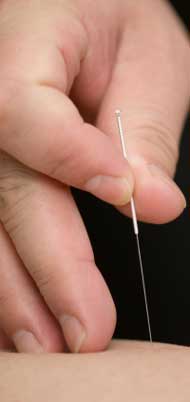Scientists have demonstrated that acupuncture blocks stress by regulating hormones. Research published in the prestigious Journal of Endocrinology shows that acupuncture blocks elevations in hormones activated by stress. The acupuncture group was compared with a control group and a sham acupuncture, simulated acupuncture, group. Only the true acupuncture group showed the clinical benefits of hormone related stress reduction.
 Acupuncture NeedleGetting to the Point
Acupuncture NeedleGetting to the Point
Researchers applied electroacupuncture needles to acupuncture point ST36, Zusanli, on laboratory rats. Next, the researchers exposed the rats to stress inducing cold for ten days. The rats who did not receive acupuncture and the rats who received sham acupuncture showed the same elevations in stress related peripheral hormones ACTH and CORT. The rats receiving true electroacupuncture did not have stress induced elevations of these hormones.
Stress and The Brain
The researchers discovered that true acupuncture prevents biochemical stress-induced elevations in areas of the brain responsible for the immune system, neuroendocrine function, stress modulation, sexuality, energy storage and digestion. Together, these brain areas are know as the hypothalamus pituitary adrenal axis (HPA). The researchers also discovered that true electroacupuncture prevents stress-induced biochemical elevations in the nervous system. Acupuncture at acupuncture point ST36 regulated the sympathetic nervous system’s (SNS) response to stress and prevented elevations in the sympathetic NPY pathway. NPY, neuropeptide Y, is a strong vasoconstrictor that also causes the growth of fat and stimulates the increase of food intake, modulates stress and pain perception and regulates blood pressure.
Reference:
Eshkevari, Ladan, Eva Permaul, and Susan Elisabeth Mulroney. "Acupuncture Blocks Cold Stress-Induced Increase in Hypothalamus-Pituitary-Adrenal Axis in Rat." Journal of Endocrinology (2013).

